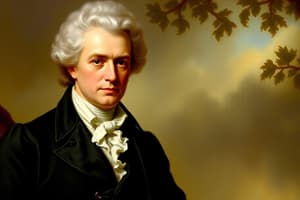Podcast
Questions and Answers
What were two nicknames for Andrew Jackson and why was he given each?
What were two nicknames for Andrew Jackson and why was he given each?
Old Hickory because of his toughness and aggressiveness during the Battle of New Orleans. King Andrew because he ignored the Supreme Court's opposition to his Indian Removal Act.
Where was Andrew Jackson from and why was that important?
Where was Andrew Jackson from and why was that important?
From Tennessee, important because he was the first 'western' president, representing land west of the Appalachian Mountains.
Andrew Jackson never forgave Henry Clay for two things. What were they?
Andrew Jackson never forgave Henry Clay for two things. What were they?
Making a corrupt bargain with John Quincy Adams and supporting federal banks during the bank war.
What was Nicholas Biddle's biggest mistake?
What was Nicholas Biddle's biggest mistake?
Flashcards are hidden until you start studying
Study Notes
Nicknames of Andrew Jackson
- Old Hickory: Reflects Jackson's toughness and aggression, particularly demonstrated during the Battle of New Orleans where he led troops from Tennessee to Mississippi.
- King Andrew: A negative nickname due to Jackson's defiance of the Supreme Court regarding the Indian Removal Act, viewed as dictatorial behavior.
Origins and Significance
- Originated from Tennessee, making Jackson the first president from west of the Appalachian Mountains, signifying a shift in political power from the established Eastern elites to the expanding Western frontier.
Rivalry with Henry Clay
- Jackson held a grudge against Henry Clay for:
- The "corrupt bargain" with John Quincy Adams, believed to have tainted the legitimacy of his own presidency.
- Clay's support of federal banks which clashed with Jackson's opposition during the Bank War.
Nicholas Biddle's Error
- Nicholas Biddle's major mistake was the dismantling of the national bank, which ultimately led to its demise and had lasting repercussions on the economy.
Studying That Suits You
Use AI to generate personalized quizzes and flashcards to suit your learning preferences.




